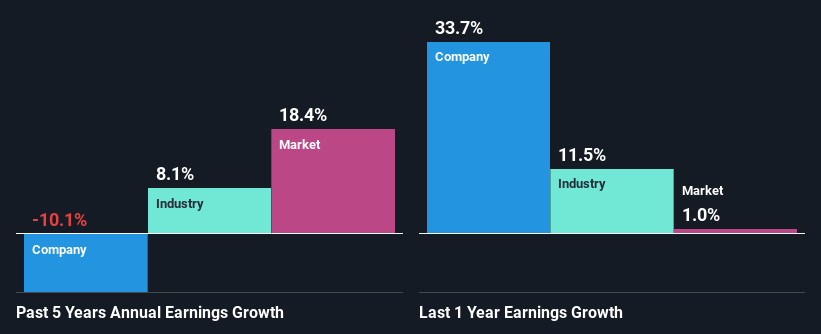Should Weakness in Westshore Terminals Investment Corporation's (TSE:WTE) Stock Be Seen As A Sign That Market Will Correct The Share Price Given Decent Financials?
Westshore Terminals Investment (TSE:WTE) has had a rough three months with its share price down 14%. However, the company's fundamentals look pretty decent, and long-term financials are usually aligned with future market price movements. Particularly, we will be paying attention to Westshore Terminals Investment's ROE today.
ROE or return on equity is a useful tool to assess how effectively a company can generate returns on the investment it received from its shareholders. Put another way, it reveals the company's success at turning shareholder investments into profits.
See our latest analysis for Westshore Terminals Investment
How Is ROE Calculated?
The formula for ROE is:
Return on Equity = Net Profit (from continuing operations) ÷ Shareholders' Equity
So, based on the above formula, the ROE for Westshore Terminals Investment is:
14% = CA$99m ÷ CA$707m (Based on the trailing twelve months to March 2024).
The 'return' is the yearly profit. So, this means that for every CA$1 of its shareholder's investments, the company generates a profit of CA$0.14.
Why Is ROE Important For Earnings Growth?
So far, we've learned that ROE is a measure of a company's profitability. We now need to evaluate how much profit the company reinvests or "retains" for future growth which then gives us an idea about the growth potential of the company. Generally speaking, other things being equal, firms with a high return on equity and profit retention, have a higher growth rate than firms that don’t share these attributes.
Westshore Terminals Investment's Earnings Growth And 14% ROE
To start with, Westshore Terminals Investment's ROE looks acceptable. On comparing with the average industry ROE of 9.0% the company's ROE looks pretty remarkable. Needless to say, we are quite surprised to see that Westshore Terminals Investment's net income shrunk at a rate of 10% over the past five years. We reckon that there could be some other factors at play here that are preventing the company's growth. Such as, the company pays out a huge portion of its earnings as dividends, or is faced with competitive pressures.
However, when we compared Westshore Terminals Investment's growth with the industry we found that while the company's earnings have been shrinking, the industry has seen an earnings growth of 8.1% in the same period. This is quite worrisome.
Earnings growth is a huge factor in stock valuation. The investor should try to establish if the expected growth or decline in earnings, whichever the case may be, is priced in. This then helps them determine if the stock is placed for a bright or bleak future. Has the market priced in the future outlook for WTE? You can find out in our latest intrinsic value infographic research report.
Is Westshore Terminals Investment Using Its Retained Earnings Effectively?
With a high three-year median payout ratio of 75% (implying that 25% of the profits are retained), most of Westshore Terminals Investment's profits are being paid to shareholders, which explains the company's shrinking earnings. With only very little left to reinvest into the business, growth in earnings is far from likely. You can see the 2 risks we have identified for Westshore Terminals Investment by visiting our risks dashboard for free on our platform here.
Moreover, Westshore Terminals Investment has been paying dividends for at least ten years or more suggesting that management must have perceived that the shareholders prefer dividends over earnings growth. Looking at the current analyst consensus data, we can see that the company's future payout ratio is expected to rise to 112% over the next three years.
Summary
Overall, we feel that Westshore Terminals Investment certainly does have some positive factors to consider. Yet, the low earnings growth is a bit concerning, especially given that the company has a high rate of return. Investors could have benefitted from the high ROE, had the company been reinvesting more of its earnings. As discussed earlier, the company is retaining a small portion of its profits. With that said, we studied current analyst estimates and discovered that analysts expect the company's earnings growth to improve slightly. Sure enough, this could bring some relief to shareholders. To know more about the company's future earnings growth forecasts take a look at this free report on analyst forecasts for the company to find out more.
Have feedback on this article? Concerned about the content? Get in touch with us directly. Alternatively, email editorial-team (at) simplywallst.com.
This article by Simply Wall St is general in nature. We provide commentary based on historical data and analyst forecasts only using an unbiased methodology and our articles are not intended to be financial advice. It does not constitute a recommendation to buy or sell any stock, and does not take account of your objectives, or your financial situation. We aim to bring you long-term focused analysis driven by fundamental data. Note that our analysis may not factor in the latest price-sensitive company announcements or qualitative material. Simply Wall St has no position in any stocks mentioned.
Have feedback on this article? Concerned about the content? Get in touch with us directly. Alternatively, email editorial-team@simplywallst.com

 Yahoo Finance
Yahoo Finance 
